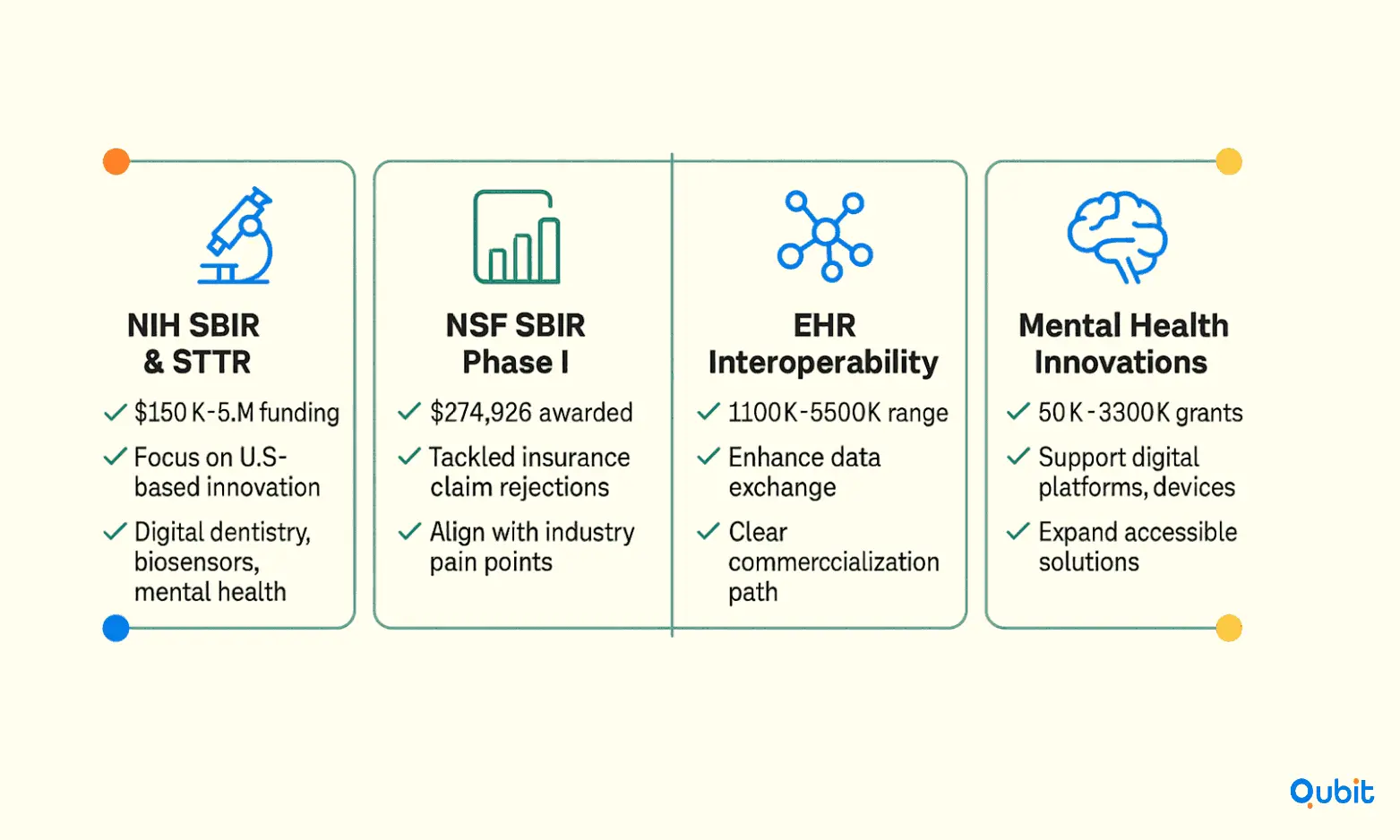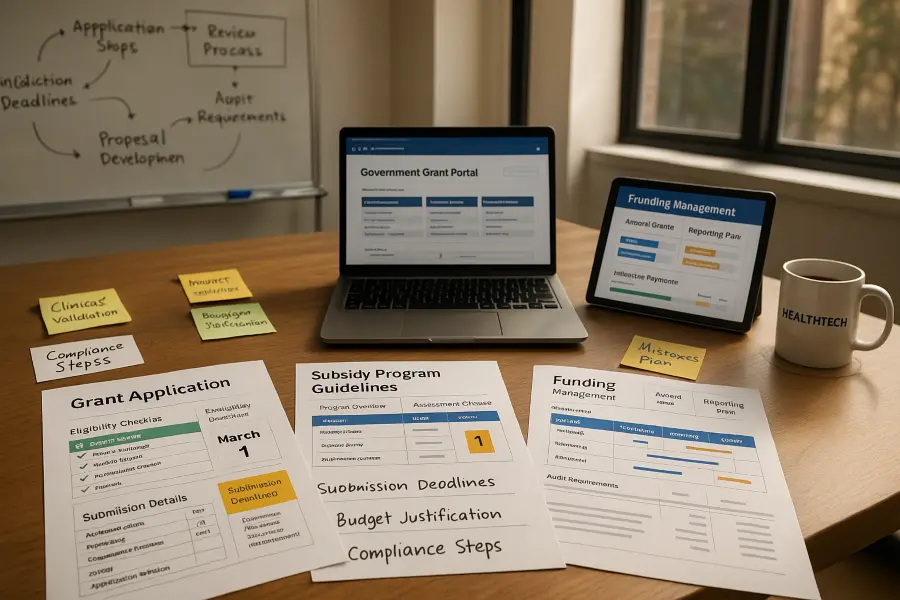Government grants for health tech startups have become a cornerstone for innovation in healthcare, enabling entrepreneurs to transform ideas into impactful solutions. With consumer interest in mobile health solutions surging—evidenced by $401 million invested across 45 deals—these funding opportunities are more critical than ever. Startups can access capital without sacrificing equity, ensuring sustainable growth while addressing pressing healthcare challenges.
For those seeking tailored development support, companies like Arkenea specialize in building HIPAA-compliant web and mobile applications, offering practical solutions to streamline operations. Additionally, exploring non-dilutive healthcare funding provides complementary avenues to secure resources while preserving ownership.
This article will guide HealthTech startups through eligibility criteria, application processes, and comparisons with alternative funding sources. Let’s dive into the details!
Healthcare Technology Grants
Securing funding is often a critical hurdle for HealthTech startups, especially those focused on innovative solutions like EHR interoperability, wearable biosensors, and mental health devices. Government grants for HealthTech startups provide a vital lifeline, offering financial support to bridge early-stage funding gaps and accelerate development. This section explores 17 specific government grants tailored to HealthTech entrepreneurs, detailing eligibility criteria, grant sizes, and actionable insights to maximize your chances of success.

1. National Institutes of Health (NIH) SBIR & STTR Grants
The NIH Small Business Innovation Research (SBIR) and Small Business Technology Transfer (STTR) programs are among the most prominent funding opportunities for HealthTech startups. These grants focus on fostering innovation in areas like digital dentistry, biosensors, and mental health technologies. Eligibility typically requires startups to be U.S.-based and majority-owned by individuals or small entities. Grant sizes range from $150,000 for Phase I to over $1 million for Phase II.
For a deeper dive into NIH-specific grants, explore nih sbir sttr grants health startups, which provides clarity on criteria and processes that complement your application strategies.
2. NSF SBIR Phase I Grant: A Case Study
One standout example of how government grants can transform HealthTech startups is the Tampa-based company that secured a $274,926 NSF SBIR Phase I grant. This funding was used to address high insurance claim rejection rates through code-augmented policy implementation. Their success highlights the importance of aligning your innovation with pressing industry challenges.
3. Grants for EHR Interoperability
Electronic Health Record (EHR) interoperability remains a priority for healthcare innovation. Grants in this category often focus on improving data exchange between systems, enhancing patient care, and reducing administrative burdens. Startups working on solutions in this space can access funding ranging from $100,000 to $500,000, depending on the scope and impact of their projects.
4. Funding for Wearable Biosensors
Wearable biosensors are revolutionizing patient monitoring and preventive care. Government grants targeting this niche often prioritize startups developing devices that integrate seamlessly with healthcare systems. Eligibility typically requires proof of concept and a clear commercialization pathway.
5. Mental Health Device Innovations
Mental health technologies, including wearable devices and digital platforms, are receiving increased attention from grant programs. These grants aim to address the growing demand for accessible mental health solutions, with funding amounts ranging from $50,000 to $300,000.
Staying Updated on New Opportunities
Keeping track of emerging funding opportunities is essential for pitch readiness. Services like Fundraise Insider offer curated lists of fresh funding leads for startups. This resource can be invaluable for staying ahead in the competitive grant landscape.
Actionable Insights for Success
- Tailor Your Application: Align your proposal with the grant’s objectives and demonstrate how your innovation addresses critical healthcare challenges.
- Leverage Case Studies: Use examples like the Tampa-based startup to showcase your potential impact and scalability.
- Stay Informed: Regularly monitor funding opportunities through platforms like Fundraise Insider to ensure you don’t miss out on relevant grants.
For a comprehensive framework that ties together various funding stages and strategies, check out how to secure funding for healthcare startups. This guide offers actionable steps to complement your grant-seeking strategy.
Other Funding Sources for Healthcare Startups
Healthcare startups often require diverse funding streams to scale their operations and bring innovative solutions to market. While government grants for health tech startups provide essential support, private funding options such as accelerators and incubators offer unique advantages. These programs not only provide seed funding but also deliver mentorship, networking opportunities, and access to industry expertise.
Accelerators and Incubators: A Launchpad for Growth
Accelerators and incubators have become pivotal in the healthcare startup ecosystem. These programs are designed to nurture early-stage companies by offering structured guidance, financial backing, and connections to potential investors. Unlike government grants, which often come with rigid application processes and specific eligibility criteria, private accelerators and incubators provide a more dynamic and tailored approach to startup development.
Key Players in the Space
Several prominent programs have established themselves as leaders in supporting healthcare startups:
- Rock Health: Known for its focus on digital health, Rock Health provides seed funding, mentorship, and access to a vast network of healthcare professionals and investors. Startups in this program benefit from a strong emphasis on innovation and scalability.
- Healthbox: This program combines funding with a robust mentorship framework, helping startups refine their business models and navigate the complexities of the healthcare industry. Healthbox also facilitates pilot opportunities with healthcare providers, enabling startups to test their solutions in real-world settings.
- Other Notable Programs: Programs such as Y Combinator and Plug and Play Tech Center also extend their resources to healthcare startups, offering a mix of funding, mentorship, and exposure to global markets.
Other Notable Support Mechanisms
- State-Level Grants and Subsidies:
- Many state governments are rolling out their own HealthTech grants, subsidies for diagnostics, and incentives for rural healthcare technology deployment.
- International Collaborations:
- Cross-border grants and partnerships with global agencies (e.g., WHO, Gates Foundation) are supplementing domestic funding for digital health, AI, and pandemic response.
For startups seeking structured mentorship and additional capital opportunities, a review of healthtech accelerator seed funding uncovers early-stage investment programs and mentorship opportunities, which enhances your understanding of innovative funding channels.
Comparing Private and Public Funding
Private funding sources like accelerators and incubators complement government grants by addressing gaps that public funding often cannot fill. While government grants for health tech startups typically focus on research and development, private programs emphasize commercialization and market readiness. This dual approach enables startups to progress from concept to execution more effectively.
Moreover, private programs often operate on shorter timelines, allowing startups to access resources and funding more quickly. This agility is particularly valuable in the fast-paced healthcare sector, where timely innovation can significantly impact patient outcomes.
Beyond Funding: The Value of Networks
One of the most significant advantages of private accelerators and incubators is the access they provide to extensive professional networks. These connections can lead to partnerships, pilot programs, and even additional funding opportunities. For instance, many accelerators host demo days where startups pitch their ideas to a room full of investors, healthcare executives, and industry leaders.
Additionally, exploring impact investing healthcare startups expands your perspective by exploring models where financial returns and social outcomes coalesce, enriching your funding review.
How Startups Can Access These Opportunities
- Monitor central and state government portals for calls for proposals, grant applications, and scheme updates.
- Partner with leading research institutions (IITs, AIIMS, ICMR) to leverage infrastructure and collaborative grant opportunities.
- Engage with industry associations to advocate for policy changes and stay informed about new incentives.
- Focus on priority areas like AI in healthcare, rural health access, mental health, and indigenous medical device manufacturing to align with government funding priorities.
- Prepare strong proposals that demonstrate innovation, scalability, and alignment with national health goals.
Conclusion
Securing funding for HealthTech innovation is not just about accessing resources; it’s about strategically aligning with opportunities that drive growth. This article highlighted the critical role of government grants in fostering innovation while also exploring private accelerators as complementary funding avenues. By understanding these options, startups can create a balanced approach to financial planning.
The insights shared here emphasize the importance of crafting a clear funding roadmap. Whether you’re targeting public grants or private investments, taking actionable steps now can position your HealthTech venture for long-term success.
If you’re looking to de-risk your raise while protecting ownership, at Qubit we understand non-dilutive stacks, investor signals, and diligence readiness. Strengthen your round through our assistance for healthcare startups and connect with our team today.
Key Takeaways
- Government grants offer essential non-dilutive funding for HealthTech startups.
- Detailed eligibility criteria and real-world case studies provide actionable insights.
- The guide covers a broad spectrum of grant options, from EHR projects to wearable biosensors.
- Alternative funding sources such as accelerators can complement public grants.
Frequently asked Questions
What government grants are available for health tech startups?
Health tech startups can access a range of government grants tailored to specific areas of innovation. These include funding opportunities for projects like EHR interoperability, mental health device development, digital dentistry advancements, and wearable biosensors. Such grants aim to close early-stage funding gaps and encourage technological breakthroughs in healthcare.






